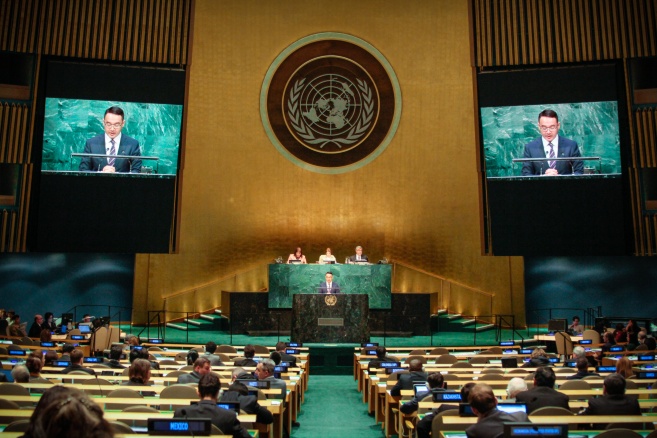Kazakh Deputy Foreign Minister Yerzhan Ashikbayev addressed the plenary session of the Treaty on the Non-Proliferation of Nuclear Weapons (NPT)review conference April 27 in New York.
 The senior diplomat saidAstana remained convinced that the NPT is the “foundation of the non-proliferation regime and global security,” which “should be fully strengthened.”
The senior diplomat saidAstana remained convinced that the NPT is the “foundation of the non-proliferation regime and global security,” which “should be fully strengthened.”
According to the foreign ministry’s press release, Ashikbayev said “Kazakhstan considers that it is necessary to seek effective and balanced implementation of the three components of the treaty: nuclear disarmament, non-proliferation and peaceful uses of atomic energy.”
Ashibayev’s remarks emphasised further that in the face of the “deteriorating situation” with international security, adherence to the fundamental principles of international law was vital, including “peaceful settlement of disputes, non-use or threat of use of force, territorial integrity and inviolability of borders.”
Addressing the conference delegates, the deputy minister also highlighted his nation’s contribution to nuclear disarmament and non-proliferation. The diplomat mentioned Astana’s already-implemented initiative to declare Aug. 29 as the UN International Day against Nuclear Tests and a proposal on adoption of a UN Universal Declaration of a Nuclear-Weapons-Free World. He also urged the delegates to back The ATOM Project, a Kazakh-sponsored campaign seeking to raise worldwide awareness of the tragic impact of nuclear tests and mobilise support for early ratification of the treaty banning the tests altogether.
As co-chair of the Conference on Article XIV of the Comprehensive Nuclear Test Ban Treaty (CTBT), which will be held in September in New York, Ashikbayev once again called upon the countries which have not yet signed or ratified the CTBT to do so as soon as possible.
The diplomat’s statement also welcomed ratification of the protocol on negative assurances to the treaty on the zone free of nuclear weapons in Central Asia (the Semipalatinsk Treaty) by France, UK, Russia, and China and urged the U.S. government to complete the process of its ratification as soon as possible. [In his own speech from the UN rostrum on April 27, U.S. Secretary of State John Kerry said “the United States submitted the Protocol to the Central Asia Nuclear-Weapon-Free Zone Treaty to the U.S. Senate for its advice and consent to ratification.]
Development of peaceful nuclear energy is an inalienable right of each of the NPT member countries and to this end, Kazakhstan is working closely with the International Atomic Energy Agency (IAEA). Kazakhstan is nearing completion of a joint project with the IAEA to host the bank of low-enriched uranium under the agency’s auspices.
The 2015 NPT review conference is being held April 27-May 22 at the United Nations (UN). According to the UN website, the NPT is “a landmark international treaty whose objective is to prevent the spread of nuclear weapons and weapons technology, to promote cooperation in the peaceful uses of nuclear energy and to further the goal of achieving nuclear disarmament and general and complete disarmament.”So far, the NPT represents the only binding commitment in a multilateral treaty to the goal of disarmament by the nuclear-weapon states.
Conferences to review the operation of the treaty have been held at five-year intervals since the accord went into effect in 1970. Each conference has sought to find agreement on a final declaration that would assess the implementation of the treaty’s provisions and make recommendations on measures to further strengthen it, with anti-nuclear activists and a number of states, including Kazakhstan, urging more progress in the practical implementation of the treaty by all of its signatories.
